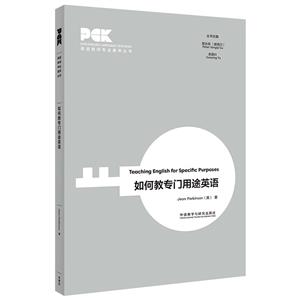-
>
西班牙语词根宝典
-
>
英语大书虫世界经典名译典藏书系:中国人的精神 (英汉对照)(精选权威版本)
-
>
许渊冲译唐诗三百首:汉文·英语
-
>
四级词汇词根+联想记忆法:乱序版
-
>
The secret garden
-
>
英国文学名篇选注
-
>
许渊冲译千家诗
如何教专门用途英语(英语教师专业素养丛书) 版权信息
- ISBN:9787521342925
- 条形码:9787521342925 ; 978-7-5213-4292-5
- 装帧:一般胶版纸
- 册数:暂无
- 重量:暂无
- 所属分类:>>
如何教专门用途英语(英语教师专业素养丛书) 本书特色
·由专门用途英语教学领域的专家琼·帕金森(Jean Parkinson)副教授撰写,为课堂内外的实践提供了灵活方便的应用工具。 ·为教授或有意教授专门用途英语的教师量身打造,语言简易、脉络清晰。 ·内容涉及专门用途英语的概念、专门用途英语的学生的需求和目标,以及专门用途英语的课程设计、教材开发和评估测试等多个方面。
如何教专门用途英语(英语教师专业素养丛书) 内容简介
何为专门用途英语?它的教学与一般英语教学有何不同之处?《如何教专门用途英语/英语教师专业素养丛书》为教授或有意教授专门用途英语的教师量身打造,语言简易、脉络清晰,先是厘清了专门用途英语的概念,然后分析了学习专门用途英语的学生的需求和目标,*后详述了专门用途英语的课程设计、教材开发和评估测试等种种不同的方法,为课堂内外的实践提供了灵活方便的应用工具。
如何教专门用途英语(英语教师专业素养丛书) 目录
Chapter 1 What is English for Specific Purposes?
1.1 Introduction 3
1.2 The defining features of English for Specific Purposes 7
1.3 Why specificity? 9
1.4 Summary of the chapter 11
1.5 What should a teacher do after reading this chapter? 12
Chapter 2 Needs analysis in ESP
2.1 Introduction 15
2.2 Why do we need to analyse our students’ language learning needs? 16
2.3 What is needs analysis? 17
2.4 What methods can we use to do a needs analysis? 21
2.5 Summary of the chapter 29
2.6 What should a teacher do after reading this chapter? 30
Chapter 3 Qualitative approaches to investigating student needs
3.1 Introduction 33
3.2 Some examples of studies of ESP students’ language needs using qualitative methods 34
3.3 Summary of the chapter 47
3.4 What should a teacher do after reading this chapter? 47
Chapter 4 Curriculum development in ESP
4.1 Introduction 51
4.2 Developing the curriculum 53
4.3 Teacher professional development 62
4.4 Summary of the chapter 64
4.5 What should a teacher do after reading this chapter? 64
Chapter 5 Approaches to curriculum design
5.1 Introduction 69
5.2 A theme-based approach 70
5.3 A genre-based approach 74
5.4 An academic skills approach 77
5.5 A notional-functional approach 79
5.6 A critical approach 82
5.7 Collaborating with disciplinary experts 83
5.8 Summary of the chapter 87
5.9 What should a teacher do after reading this chapter? 87
Chapter 6 The use of genre analysis in ESP
6.1 Introduction: what is genre? 91
6.2 The linguistic features of a genre 95
6.3 How teachers can promote students’ genre awareness 101
6.4 Example of a written genre: email communication 108
6.5 Example of a spoken genre: nurse-patient communication 110
6.6 Summary of the chapter 112
6.7 What should a teacher do after reading this chapter? 113
Chapter 7 The contribution of register analysis to ESP
7.1 Introduction 117
7.2 Contribution of register analysis to teaching disciplinary texts at school 120
7.3 Contribution of register analysis to teaching vocabulary in a university course 122
7.4 Contribution of register analysis to course development for workplace training 124
7.5 Contribution of register analysis to teaching grammar and register of professional discourse 126
7.6 Teaching register features 131
7.7 Summary of the chapter 133
7.8 What should a teacher do after reading this chapter? 133
Chapter 8 Materials development in ESP
8.1 Introduction 137
8.2 The process of materials development 141
8.3 Evaluating materials 147
8.4 Some examples of materials design 149
8.5 Summary of the chapter 153
8.6 What should a teacher do after reading this chapter? 154
Chapter 9 Assessment in ESP
9.1 Introduction: why are specific purposes tests needed? 157
9.2 Authenticity of task 158
9.3 Specific purposes language and specific purposes background knowledge 159
9.4 Writing assessment tasks 164
9.5 Summary of the chapter 166
9.6 What should a teacher do after reading this chapter? 167
Chapter 10 Conclusion
Key principles of English for Specific Purposes that have been discussed in this book 171
Glossary 175
References 181
如何教专门用途英语(英语教师专业素养丛书) 作者简介
琼·帕金森(Jean Parkinson)是新西兰惠灵顿维多利亚大学应用语言学与TESOL(对外英语教学)副教授,曾在南非教授科学与技术的专门用途英语,现教授专门用途英语和话语分析的硕士课程,以及跨学科英语和工程学写作的本科课程。近来的研究方向为职业教育中的语言使用,在此领域著有《职业用途英语:职业教育中的语言使用》(劳特利奇出版社)。她是《TESOLANZ杂志》总编辑。
- >
罗曼·罗兰读书随笔-精装
罗曼·罗兰读书随笔-精装
¥31.9¥58.0 - >
李白与唐代文化
李白与唐代文化
¥11.9¥29.8 - >
月亮虎
月亮虎
¥14.4¥48.0 - >
推拿
推拿
¥12.2¥32.0 - >
诗经-先民的歌唱
诗经-先民的歌唱
¥13.5¥39.8 - >
巴金-再思录
巴金-再思录
¥14.7¥46.0 - >
经典常谈
经典常谈
¥12.7¥39.8 - >
上帝之肋:男人的真实旅程
上帝之肋:男人的真实旅程
¥19.3¥35.0
-
赖世雄的英语学习法
¥16.4¥45 -
4.23文创礼盒A款--“作家言我精神状态”
¥42.3¥206 -
4.23文创礼盒B款--“作家言我精神状态”
¥42.3¥206 -
一句顶一万句 (印签版)
¥40.4¥68 -
百年书评史散论
¥14.9¥38





















